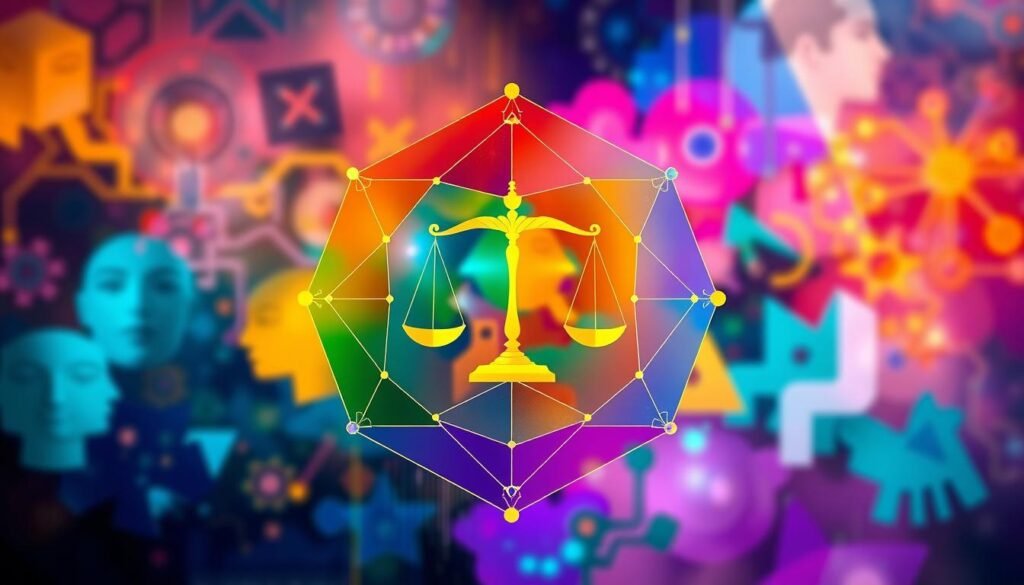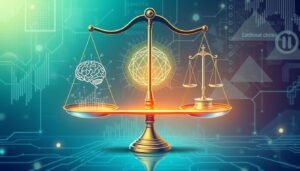Artificial Intelligence (AI) is growing fast and entering important areas like healthcare and transportation. This brings up new ethical questions. It’s not just about following rules; it’s key for innovation to last.
Data science ethics are at the heart of AI. They guide everything from making algorithms to handling data. Companies face big questions about bias, transparency, and privacy. They must rethink how to use AI responsibly.
This article starts a deep look into AI’s ethics. We’ll explore six key data ethics principles for using AI and machine learning wisely. Understanding these principles helps us find ways to develop AI ethically and responsibly.
Key Takeaways
- Commitment to ethical AI practices involves securing explicit consent for data collection, strengthening user trust.
- Maintaining transparency in AI systems is instrumental in demystifying data processes and building user confidence.
- Enhancing privacy through anonymization and data minimization can protect personal information within AI infrastructures.
- Implementing diverse sampling techniques is essential to minimize biases and ensure fair representation in AI models.
- Compliance with regulations like GDPR and CCPA is critical to navigate legal landscapes and preserve stakeholder trust.
- Investment in high-quality data is fundamental for the accuracy and reliability of AI systems, reducing risk of errors.
- Recognizing the broader societal impact of AI, including job displacement, requires proactive measures for workforce adaptation.
The Importance of Ethics in AI and Data Science
Artificial intelligence (AI) and data science are changing our world fast. The talk about ethics in AI and ethics in data science is getting louder. These technologies have great power but also big ethical questions to answer.
The Growing Influence of AI Across Sectors
AI is now in many areas like healthcare, finance, and education. It can change things for the better but also raises big questions. For example, AI in healthcare can help a lot but also makes us wonder about privacy and accuracy.

Ethical Foundations for Responsible AI Development
To make AI responsible, we need to think about ethics from the start. This means making sure AI is transparent, accountable, and fair. We must make sure AI doesn’t cause harm or discriminate.
Learn more about the ethics of AI and data science to see why it matters.
| Key Issue | Details | Example |
|---|---|---|
| Privacy Concerns | Protecting personal information in AI applications | GDPR compliance in data handling |
| Bias and Fairness | Addressing and mitigating bias in machine learning models | Review and adjustment of Amazon’s AI hiring tools |
| Transparency and Accountability | Clear responsibilities in AI decision-making processes | IBM’s transparent AI guidelines for ethical development |
| Ethical Frameworks | Guidelines for responsible decision-making in AI | Application of the Belmont Report’s principles |
| Risk Mitigation | Evaluation of possible harms in AI deployments | Systematic checks in AI-driven facial recognition software |
This way of thinking helps make AI better and more trustworthy. It makes AI more useful and accepted worldwide.
AI and Data Science Ethics
The world of artificial intelligence and data science is changing fast. These technologies are now key in many areas. It’s vital to know about AI fairness, data privacy, and ethical frameworks.
Only 15% of data science teachers cover AI ethics. This might leave future data scientists unready for ethical challenges. But, places like UNC Charlotte’s School of Data Science teach ethics in every course. This shows a strong commitment to ethics.
There are also big projects across the country working on AI ethics. These projects aim to reduce biases and improve AI standards. For example, research at over 33 institutions is working on better healthcare algorithms.
- Focus on training data’s accuracy to ensure machine learning models are free from inherent biases that could skew their output.
- Implement governance structures and clear accountability mechanisms.
- Make AI systems more transparent to build trust and ensure fairness.

Dealing with AI and data science ethics also means protecting data privacy. Laws are getting stronger worldwide. In 2023, new data privacy laws were passed to protect personal data.
| Year | Development | Impact |
|---|---|---|
| 2022 | Rise in proposed laws to prevent discrimination in algorithms | Enhances ethical deployment of AI technologies |
| 2023 | Key changes in data privacy laws focusing on individual rights | Strengthens protections for personal data within AI systems |
“AI fairness and ethics are not just niceties but foundational for building trust and ensuring technology beneficence.”
As AI grows, ethics become more important. They are not just rules but key to AI’s success and fairness. Data scientists and companies must always aim for high ethics. This is not just for following rules but for creating fair and just innovations.
Transparency and Accountability in AI Systems
In today’s world, AI plays a big role in our lives. It’s key to have AI transparency and AI accountability. We need to make AI’s decision-making processes clear and understandable. This helps with algorithmic explainability and follows machine learning ethics.
Research shows people want AI to be more open. But, there’s a gap between what companies say and what people believe. Only 30% of consumers trust AI systems, even though 90% of executives think they’re doing a good job. This shows we need real steps towards AI transparency.
The Role of Explainability
Explainability is key for ethical AI. Tools like LIME help break down AI’s complex workings. They make AI’s decisions easier to understand. This is very important in finance, where keeping data safe and clear is a big challenge.
By making AI explainable in all areas, we follow rules and improve ai decision-making ethics everywhere.
Building Trust Through Audits and Impact Assessments
Audits and impact assessments are key for AI accountability. They check if AI follows ethical and legal rules. This prevents problems like privacy issues or biased AI.
Regular checks and monitoring keep AI trustworthy. They make sure AI meets society’s and law’s standards.
To have a future where AI is both clear and responsible, we all need to work together. Developers, businesses, lawmakers, and users must join forces. This way, we can make AI that respects machine learning ethics and ensures AI accountability.
Data Privacy and Security Concerns
In recent years, the mix of data privacy in AI, machine learning ethics, and data science for good has grown more important. As technology advances, so do the threats to our personal and sensitive data.
Laws like the General Data Protection Regulation (GDPR) and the California Consumer Privacy Act (CCPA) set strict rules to protect our data. These laws require businesses to use strong security measures and give users more control over their information. This creates a solid base for data privacy and ethics.
Even though anonymizing data is common, it’s not always safe. Scandals like Facebook’s Cambridge Analytica and Google’s Street View project show the dangers of big data. These examples stress the need for better data privacy in AI through various methods.
- Using two-factor authentication (2FA) and encryption.
- Companies like Apple using end-to-end encryption to protect user data.
- AI helping improve efficiency while following data protection rules.
With more online shopping and IoT devices, we need better security than ever. IoT technology must be tested and secured well to avoid data breaches. This aligns with data ethics and keeps user privacy safe.
Machine learning ethics push for AI to be transparent. This ensures AI systems don’t misuse data. This focus on ethics is key to building trust between users and tech providers, supporting data science for good.
Fields like healthcare and finance are very sensitive to data. They need clear rules and regulations to protect data privacy and integrity. Using AI in these areas shows the importance of a strong ethical AI foundation, highlighting the need for data privacy and ethics.
Cybersecurity is a major concern, with IT jobs like cybersecurity engineers being very important. Their work is vital in keeping our data safe.
Bias and Fairness in Machine Learning
In the fast-changing world of tech, tackling bias in AI is key. It’s not just right; it’s necessary for AI to be accepted. AI fairness and bias affect every part of tech, from data to the teams that work on it.
Fixing bias in AI starts with knowing where it comes from. Many things can lead to bias, like bad data collection or not enough diversity in data. These issues can make AI systems unfair, favoring some over others.
Identifying and Mitigating Bias
Finding and fixing bias in AI is a big job. It needs careful work and the right tools. For example, facial recognition can be unfair to different ethnic groups. If we don’t fix this, AI can make unfair decisions, hurting trust.
To solve these problems, we can use diverse data to train AI. This helps avoid old biases. We also need to keep checking and updating AI to make sure it stays fair.
Promoting Diversity and Inclusion in AI Development
Having diverse teams is key to fair AI. Diverse teams spot biases that others might miss. This diversity helps make AI that’s fair and just for everyone.
Companies are starting to take steps to make AI fair. They’re setting up rules for AI and teaching ethics. They’re also making sure data is balanced and fair. This helps make AI that’s good for everyone.
In short, making AI fair and unbiased is a big job. It needs work from everyone involved in AI. By working together and being inclusive, we can make AI that’s smart and fair.
Consent and Data Ownership Challenges
In the world of AI and data science, consent and data ownership are big challenges. As AI becomes part of our daily lives, it’s key to protect and respect our data. This ensures our privacy and freedom.
Navigating Consent in Complex AI Ecosystems
AI is always changing, so consent needs to change too. We can’t just get consent once and forget about it. It must keep evolving with AI.
This way, we make sure people know and agree with how their data is used. It’s about keeping up with AI’s fast pace and staying ethical.
Empowering Users with Data Rights and Ownership
It’s important to give people control over their data. AI systems should help users understand their data rights. This builds trust and promotes ethical AI.
The table below shows what makes AI ethical. It includes informed consent, keeping data anonymous, and being open about how data is used. These are all connected and important.
| Informed Consent | Data Anonymity | Data Security | Transparency |
|---|---|---|---|
| Implementation of continuous informed consent mechanisms | Strict measures to anonymize personal data | Rigorous data protection strategies to prevent breaches | Complete documentation of AI methodologies |
| Clear information on data usage and opt-out provisions | Removal of personally identifiable information | Secure data storage and transaction systems | Public disclosure of algorithmic decision-making processes |
By focusing on these key points, we can make AI more ethical. This means better rules for data use, protection, and consent. It’s about finding a balance between technology and ethics, so we can innovate while respecting our rights.
AI Governance and Regulation
In today’s fast-changing tech world, AI governance and AI regulation are key. They help ensure AI follows societal values and is used responsibly. The White House and the Organisation for Economic Co-operation and Development (OECD) have set new standards for ethical AI solutions.
AI is now in many areas of life, making it vital to have clear AI ethics guidelines. Companies and governments are setting rules for safe and secure AI use. This makes AI development more structured and clear.
- The White House has issued an executive order on AI safety, pushing for new risk management standards.
- The OECD’s AI Principles focus on transparency, fairness, and accountability, aiming for trustworthy AI.
- The EU’s proposed AI Act categorizes AI systems by risk level, requiring strict rules for high-risk ones.
There’s a delicate balance between encouraging innovation and ensuring AI is safe and fair. This balance is achieved through a mix of laws and soft law. Laws provide a solid base, while soft laws adapt to new challenges and tech quickly.
| Approach | Description | Examples |
|---|---|---|
| Traditional Laws | Government-enforced rules with legal consequences for breaking them. | EU AI Act, U.S AI Standards |
| Soft Laws | Flexible guidelines that encourage good behavior through ethics and cooperation. | OECD AI Principles, Corporate Ethics Boards |
| Hybrid Approaches | Methods that mix traditional and soft laws for full governance. | Collaborative AI Governance Schemes |
Global efforts in AI governance show a move towards ethical AI systems. This ensures AI regulation keeps up with AI’s rapid growth. We’re moving towards innovation that’s both responsible and ethically sound.
AI in Healthcare Ethics
The use of artificial intelligence (AI) in healthcare is changing fast. It brings new chances for better care and more treatments. But, it also raises big ethical questions. Finding a balance is key to keeping healthcare trustworthy and honest.
Privacy, Confidentiality, and Autonomy in Medical Data
Keeping patient data safe is a big worry with AI. Laws like the GDPR in the EU and GINA in the U.S. help protect this. But, AI can handle so much data that privacy can be at risk. It’s important to make sure AI keeps patient data safe and private.
The Balancing Act: Innovation vs. Ethical Obligations
AI in healthcare should not forget about ethics. Issues like AI and human rights show we need to make sure AI is fair. We must also avoid making health problems worse for some groups. Creating an ethical AI plan for healthcare means making sure everyone benefits equally.
| Issue | Relevant Regulation or Fact | Impact on Ethical AI Development |
|---|---|---|
| Data Privacy Concerns | GDPR | Forces stricter data protection protocols in AI development. |
| Genetic Discrimination | GINA | Prevents misuse of genetic data in healthcare AI. |
| Biased AI Algorithms | Racial bias in commercial algorithms | Necessitates development of unbiased, fair AI systems. |
| Patient Autonomy | Right to informed consent and treatment refusal | Ensures AI respects patient choices and privacy. |
AI Decision-Making and Human Rights
The use of AI in many areas has raised big worries about AI decision-making ethics and the ethical implications of AI. AI’s ability to make choices on its own affects AI and human rights a lot. These systems need to follow rules that protect human dignity and make sure they are trustworthy AI.
For example, a big experiment on Facebook involved nearly 700,000 users without their consent. This shows how big the ethical gaps are. Also, AOL’s mistake with deidentified data shows the dangers of not protecting data well.
Ethical AI development means more than just good tech. It’s about really caring about human rights. AI should keep privacy safe, be fair, and not discriminate. It’s also important in big decisions like loans, jobs, and health care to make sure things are fair.
| Year | Global AI Spending ($ Billion) | Top Industries Investing |
|---|---|---|
| 2021 | 50 | Retail, Banking |
| 2024 (Projected) | 110 | Media, Government |
To tackle these issues, people from all walks of life are pushing for ethics in AI. Fixing problems like bias, privacy issues, and making sure AI acts like it’s human is key. This helps AI work in a way that’s good for society and people.
Social Impact of AI and the Responsibility of Tech Companies
Artificial intelligence (AI) is changing fast and has big promises for society. But, it also brings up big worries about its social impact of AI. As AI becomes more part of our lives and the world’s economy, it’s clear that tech companies’ responsibility in using AI right is key.
Companies making AI are shaping its future. They can make it help society or cause harm. To make AI good, we need ethical AI solutions that are fair, open, and answerable.
Ensuring Social Good Through Responsible AI
To make AI for good, we must add ethics to AI making. This means writing code with ethics in mind and checking AI often to keep it ethical. For example, using fair data in AI can help avoid bias in hiring, making jobs fairer.
Addressing Unintended Consequences of AI Deployment
Even with the best plans, AI can sometimes cause problems that make things worse. So, we must work hard to mitigate AI consequences. Companies should check AI for bias or harm often. We also need rules worldwide to make sure AI is just and doesn’t hurt anyone.
By following strict ethics and fixing AI problems, companies help society and themselves. As AI changes how we work and live, it’s more important than ever for companies to use AI wisely.
Conclusion
Artificial Intelligence is becoming a big part of our lives. Developing ethical AI is now a global priority. It needs everyone’s effort and teamwork.
Only 15% of teachers teach AI ethics. This shows we have a long way to go. But, places like UNC Charlotte’s School of Data Science are leading the way. They show it’s possible to teach ethics in all data science courses.
The GenAI era is here, and data ethics is key for innovation and trust. We must teach the next AI professionals to create trustworthy AI. We also need to handle the challenges of using large language models (LLMs) with sensitive info.
Transparency is more important than ever, with billions spent on training these models. We need to have strict ethics for high-risk AI and more freedom for low-risk ones. This allows for innovation in ethical AI while keeping safety in mind.
We’re seeing changes in laws like GDPR and CCPA. The European Union’s Artificial Intelligence Act is also coming. This shows we’re moving towards a world where global AI ethics is real.
Corporate leaders are now focusing on ethical AI governance frameworks. The American Data Science Alliance will soon discuss integrating ethics into education. These steps are bringing us closer to a world where AI respects human values.
FAQ
What are the key ethical challenges in AI and data science?
The main challenges include making sure AI is fair and unbiased. We also need to protect data privacy and ensure transparency. It’s important to hold people accountable for AI actions.
Other issues include the impact of AI on society. We must navigate consent and data ownership. And we need to follow AI governance and regulations.
Why is ethics important in AI and data science?
Ethics in AI and data science make sure technology respects human values. They protect privacy and prevent discrimination. This builds trust in AI systems.
It’s key for responsible AI use. It helps avoid risks in AI decision-making.
How can we promote transparency and accountability in AI systems?
To promote transparency, we need to explain AI processes clearly. We should document changes in data versions. This makes AI actions understandable.
Accountability comes from regular audits and impact assessments. It’s about knowing who is responsible for AI actions.
What are the concerns related to data privacy and security in AI?
We worry about keeping personal info safe from unauthorized access. We must follow laws like GDPR and CCPA. Anonymization doesn’t fully protect data privacy.
We need a strong approach to data security. This includes protecting sensitive information.
How can bias and fairness in machine learning be addressed?
To reduce bias, we use diverse training data. We also promote diversity in AI teams. Equality and equity practices are important.
It’s vital to check AI models for bias. We must correct any discriminatory patterns found.
What are the challenges of consent and data ownership in AI?
Managing consent is hard as AI changes. Users must understand data use. They should have clear rights over their data.
How are AI governance and regulation evolving?
AI governance is growing with new frameworks and guidelines. The GDPR and AI Bill of Rights are examples. Companies also create their own ethical codes.
This helps them address specific challenges and stay legal.
What ethical concerns arise with AI in healthcare?
In healthcare, we worry about keeping medical data private. We must respect patient autonomy and avoid bias. We balance innovation with ethical standards.
What is the impact of AI decision-making on human rights?
AI can affect human rights like autonomy and fairness. It’s important for AI to respect human rights. This prevents rights violations and injustices.
How can tech companies address the social impact of AI?
Companies can focus on responsible AI strategies. They should consider long-term effects and fairness. They should prevent harm and use AI for good.
What does developing ethical AI entail?
Ethical AI means adding values like fairness and privacy. It respects human rights. It’s about standardizing ethics and constantly improving practices.






















35 thoughts on “How to Address Ethical Challenges in AI and Data Science Today”
9080, eh? Gave it a look. It does what it says on the tin. Not my favorite thing ever, but it works. Might be your cup of tea though, check it: 9080
Your point of view caught my eye and was very interesting. Thanks. I have a question for you.
Reading your article helped me a lot and I agree with you. But I still have some doubts, can you clarify for me? I’ll keep an eye out for your answers. https://accounts.binance.com/ar/register-person?ref=FIHEGIZ8
Finding a good 747 agent can be tough. I used 747agents and had no bad surprises. They seem pretty legit with decent service.
Der Vulkan Spiele Login ist sicher, einfach und
schnell gestaltet, damit du sofort loslegen kannst.
Besonders attraktiv für Spieler aus Deutschland sind Aktionen wie die beliebten Vulkan Spiele 50 Freispiele und der exklusive Vulkan Spiele
Bonus ohne Einzahlung. Neukunden profitieren vom attraktiven Willkommensbonus, während
regelmäßige Spieler wöchentliches Cashback genießen. Über mobile Geräte bleibt die vollständige Funktionalität
erhalten – optimiert für Smartphones und Tablets.
Die Regeln sind identisch mit denen vom Freitag – einfach
eine weitere Chance, Ihr Guthaben aufzuladen und zusätzliche Freispiele zu erhalten. Je höher Ihre
Einzahlung, desto mehr Freispiele und Bonusgeld erhalten Sie.
Die einfachste Methode, um in unserem Online Casino Österreich
von Ihrem mobilen Gerät zu spielen, ist über den Browser.
Wenn Sie in unserem Casino online spielen und dabei einmal
eine besonders dringende Frage oder ein Problem haben sollten, können Sie unseren Kundensupport kontaktieren. Unsere Insta-Spiele bei Vulkan Vegas online zeichnen sich dadurch
aus, dass es sich um kurze, schnelle Sofortgewinnspiele
mit vergleichsweise einfachen Regeln handelt. Zudem lassen sich alle Spieler entweder im Spaß- oder im Echtgeld-Modus spielen.
References:
https://online-spielhallen.de/posido-casino-freispiele-ihr-umfassender-leitfaden/
Natürlich muss man mit einem deutlichen Korn leben (übertrieben,
weil gewollt stark in der Intro-Sequenz), doch das wirkt
hier wunderbar filmisch und authentisch. Craig interpretierte Bond (noch) nicht als überzeugten Doppelagenten mit der
Lizenz zum Töten. Doch auch der durch Remmington Steele bekannt gewordene Brosnan hatte nach vier Episoden trockenen Wodka-Martinis
die Nase vom Doppelagenten voll und so ging die Suche nach einem Darsteller
erneut los. Des Weiteren ist zu erwähnen, dass der Film auf dem gleichnamigen Roman von Ian Fleming basiert
und eine Neuverfilmung ist. Im Jahre 1953 schrieb Ian Fleming den ersten Spionagethriller mit dem britischen Geheimagenten James
Bond 007 in der Hauptrolle. Wenn Sie die Gelegenheit haben, diese Drehorte zu besuchen, werden Sie die atemberaubende
Schönheit und die filmische Magie selbst erleben können.
Er erhielt zudem eine BAFTA-Nominierung in der Kategorie
Beste Kostüme. Der Film war 1968 in der Kategorie Bester Song für einen Oscar nominiert.
„Als Happening angelegte parodistische Super-Show mit enormem
technischem Aufwand. Aus dem vorhandenen Material musste am Schneidetisch eine
stimmige Handlung zusammengeschnitten werden. 2006 wurde die Romanvorlage von Eon ebenfalls unter
dem Titel „Casino Royale“ verfilmt.
References:
https://online-spielhallen.de/beste-online-casinos-deutschlands-2025-experten-test/
Alle gewünschten Spiele unter einem Dach zu finden, das ist selbst bei den Mehrmarken-Unternehmen nicht ganz einfach.
Unsere Expertin Jytte hat sich intensiv mit den Top 10 online Spielautomaten beschäftigt.
Spielautomaten dominieren die Branche seit Jahren – und
das nicht nur online, sondern auch lokal.
Grund dafür ist mit Sicherheit die Tatsache, dass diese Kategorie am vielseitigsten ist – anders als klassische Tischspiele, wie zum Beispiel Roulette oder Blackjack.
Umso selbstverständlicher erscheint es, dass viele der großen Anbieter dort zu finden sind.
Erst deutlich später ist es ihnen gelungen, die Produktpalette auch online umzusetzen.
Wer möchte, kann bekannte Automatenspiele wie Sweet Bonanza, Gates of Olympus und Wolf Gold nutzen oder brandneue Titel austesten,
um dem Glück auf die Sprünge zu helfen. Das kreative Rockwin Casino kann bei den besten Glücksspielunternehmen gefunden werden. Abschließend können bei der vierten Einzahlung ein Bonus von 150
% auf 1.500 Euro und 150 Freispiele beansprucht werden. Bei
der dritten Rate warten 50 % bis zu 1.000
Euro und 50 Freispiele. Bei der zweiten Transaktion gibt es 100 % bis zu 500
Euro und weitere 75 Freispiele.
So können Sie schneller das gewünschte Internet Casino für Ihre persönlichen Vorlieben aus unseren Ranglisten auswählen und sich
dort jeweils den attraktiven Willkommensbonus
holen. Auf jeden Fall stammen aus diesen Tests die besten Online Casinos für deutsche Spieler aus den nachfolgenden Bestenlisten,
die wir für Sie nach verschiedenen Kriterien sortiert haben.
Denn wir testen und bewerten alle Online Glücksspielanbieter für
deutsche Spieler. Die neue Lizenzbehörde hat inzwischen unzählige Lizenzen an verschiedene Anbieter virtueller Automatenspiele vergeben.
References:
https://online-spielhallen.de/boaboa-casino-promo-codes-und-angebote/
Diese Initiative haben wir mt dem Ziel gestartet, ein globales Selbstausschlusssystem zu schaffen, das es gefährdeten Spielern ermöglicht, ihren Zugang zu allen Online-Glücksspielmöglichkeiten global zu sperren. Sie können jederzeit die Suchfunktion oder
einen der verfügbaren Filter verwenden, um jenes Spiel zu finden, nach
dem Sie suchen. Hierdurch können diese Spiele grundsätzlich auf jedem Gerät, das mit einem modernen Browser ausgestattet ist, gespielt
werden. Nach entsprechenden Gewinnen können Sie Echtgeldauszahlungen veranlassen. Klicken Sie dann darauf und schon wird das Spiel
für Sie geladen, ist einsatzbereit und kann von Ihnen gespielt werden.
Von Slots bis Live Poker kannst du hier ohne Anmeldung und ohne Einzahlung spielen.
Gaminator Credits können nicht gegen Geld getauscht oder in irgendeiner Form
ausbezahlt werden, sondern nur verwendet werden, um Spiele zu spielen.
Gaminator ist eine kostenlose Online-Glücksspiel-Plattform, die ausschließlich
Unterhaltungszwecken dient. Hunderttausende Menschen spielen bereits die Gaminator-App, und wir könnten uns keine bessere Empfehlung vorstellen.
References:
https://online-spielhallen.de/lapalingo-casino-auszahlung-alles-was-sie-wissen-mussen/
Zu Beginn erwartet dich ein 400% Einzahlungsbonus bis zu
40€ sowie 100 Cash Spins, die du direkt nutzen und ohne Umsatzbedingungen auszahlen kannst.
Neben den zahlreichen Sportwetten findest
du hier auch über 800 virtuelle Automaten, die du unter anderem mit einem 400%
Willkommensbonus bis zu 80€ nutzen kannst. Wildz steht auf der Whitelist der
GGL und darf somit virtuelle Spielautomaten legal in Deutschland anbieten. Für Bestandskunden gibt es regelmäßige Missionen und
Turniere, bei denen du dir immer wieder mal zusätzliches Bonusguthaben oder Freispiele sichern kannst.
Gleich zu Beginn gibt es einen Neukundenbonus mit 100% bis zu 100€
Du musst dich auf ein sicheres und lizenziertes Angebot verlassen können. Österreich bereitet nach Jahren politischer
Verzögerung eine umfassende Neuregulierung seines Glücksspielmarktes vor.
Die digitalen Währungen wie Bitcoin oder Ethereum und ihre Blockchains bieten viel Potenzial für den Einsatz im Glücksspielbereich.
Skrill ist eine sichere und zuverlässige Methode für online Zahlungen in Echtzeit.
Manche Casinos bieten eine eigene Casino App an, während andere auf mobil-optimierte Webseiten oder
eine progressive Web-App setzen.
Nebst dem erwähnten Live-Chat bieten diese nämlich oftmals auch Support per
Telefon, E-Mail oder eigens dafür eingerichtete Kontaktformulare an. Wir zeigen Ihnen, auf welchem Weg selbst neueste Online Casinos in Sachen Kundendienst
erreichbar sind. Die besten neuen Online Casinos bieten im Kundendienst einen Live-Chat an, der idealerweise
auch auf Deutsch erreichbar ist.
References:
https://online-spielhallen.de/joo-casino-freispiele-ihr-schlussel-zu-kostenlosem-spielspas/
She exudes a strong sense of intelligence and confidence, and her chemistry with Craig is undeniable.
Eva Green plays the stunning and enigmatic Vesper Lynd, who is assigned to accompany Bond in his mission to Montenegro.
This is the first time that a blond James Bond
has been portrayed on screen, and Daniel Craig manages
to make the role his own with ease.
Much of filming for M’s Scottish castle was done on location in County Meath,
Ireland, with Killeen Castle as the focus. Feldman approached Sean Connery to play Bond,
but rejected Connery’s offer to do the film for $1 million.
Virtually nothing from Hecht’s scripts was ever filmed, although a draft dated
to February 1964 has a line of dialogue containing the idea of MI6 having given multiple agents the name of James Bond after Bond has died to confuse the
other side. By 1964, Feldman had invested nearly $550,000 of his own money into pre-production.
References:
https://blackcoin.co/bars-the-classic-slot-machine-theme/
Again, it is ultimately up to you to choose which game suppliers
you like the most. Instead of sitting on your Bitcoin, Ethereum, Dogecoin,
Ripple, and Shiba Inu tokens, you could also take them to
a crypto casino in Australia. It is always wise to spend your money conservatively
by looking out for the best deals. Let us assume that you have been in the
game for long enough to know which flavours of ice cream you love
the most.
Yes, it is possible to get a no deposit bonus on mobile devices if a gambling platform is compatible with
phones. With best no deposit bonuses presented on this
page you can try your luck at Mechanical Clover, Elvis Frog in Vegas, Booming Bananas
slots, and others. The terms of the bonus will usually
mention which pokies can be played and which cannot.
Unfortunately no, not every Australian casino site will feature a no deposit bonus.
With all no deposit bonuses (unless marked as no-wager), the withdrawal is only possible after
you complete wagering requirements.
References:
https://blackcoin.co/clams-casino-in-depth-review/
It’s the closest thing to being in the casino without
leaving home. These machines provide fast-paced, automated action with flexible betting options and minimal wait times.
Wrest Point is home to some of Tasmania’s most competitive live
poker events. Whether you’re a weekend visitor
or a daily online player, Wrest Point tailors its rewards
to suit your style.
Yes, players can access self-exclusion options, deposit limits, and session reminders to ensure responsible gambling behavior.
Yes, our customer service is available around the clock via
live chat, email, and phone to assist with any issues
or questions. We aim to make navigation, communication, and gameplay easy and inclusive
for players from different backgrounds, enhancing the global appeal
of our casino.
References:
https://blackcoin.co/casumo-casino-review-rewards-slots-and-payments-how-is-customer-service/
This is a crucial step to ensure the safety of your gaming environment.
Visit the casino’s website and sign up by providing all the required details, such as your name, address, and birthday.
You will need to enter a few personal details that are typical when registering for any site, and then choose
from a number of secure deposit methods to fund your account Our objective is
to guide you towards the finest casino destinations, without ulterior motives.
We’re not afraid to point out any shortcomings, whether it’s a questionable deal
or an underwhelming promotion.
This is not to brag — we simply aim for perfection when creating any review content for
our AU players. As you know, there is a saying, “there’s always someone who does it better.” But what could we say about countless casino
review sites? To discover more best casinos in Australia, make sure to take a peek at
our expert guide. Online casino with a 10-dollar minimum deposit in United States Online casino with a 10-dollar minimum deposit in New Zealand
Using free spins is just like playing on a regular slot machine, except
that the spins can only be used on certain machines.
However, only some low deposit rewards are worth activating.
The catch on many promos is that the punter has to make a big
commitment to the casino before they can unlock the rewards.
Some payment methods are not permitted to be used if you’re receiving a bonus or welcome deal.
There are up to 39 payment methods available here that punters can make deposits as low as
$5 through. In terms of regulations, the casino
is operated by DAMA N.V.
References:
https://blackcoin.co/free-slots-play-32178-online-slot-games-no-download/
Malicious actors target platforms handling financial data, making it
vital to approach each session with security in mind.
Prioritize devices with up-to-date operating systems and anti-malware
software to prevent unauthorized access to Fair go casino.
Fair Go Casino offers synchronised sessions, which let you switch between platforms without interrupting active games or losing transaction histories for $.
They will check who you are and help you recover your account, making sure
that your money and gameplay are safe. When managing balances or making changes involving $ at Fair go casino, it’s important
to use strong security measures and two-factor authentication (2FA).
To set up two-factor authentication at Fair go casino,
visit the security settings section once logged in.
For additional protection, enable alerts for any account changes or large withdrawals, so activity is always tracked in real time.
Avoid linking social media profiles to your player account,
as compromised external apps can be a gateway for attackers.
Double-check the URL for typos and avoid accessing platforms through unsolicited messages or public forums.
If you visit the casino most days, or even just
several times a week, you are more likely to want to know about new games.
FairGo is a fair play site, and that doesn’t just mean being fair in allowing players to play practice games.
How about securing a generous welcome bonus on your first five deposits instead of just one?
References:
https://blackcoin.co/fair-go-casino-login-guide/
Royal Reels Casino’s extensive selection of games offers ample opportunities for both seasoned players
and beginners to refine their strategies, maximizing
long-term success in the dynamic world of online gaming.
At Royal Reels Casino, we offer a diverse selection of pokies and
casino games, enhanced with superior bonuses and an enriched
gaming experience. Royal Reels Casino is a newly launched casino that offers over 2000 games, including live dealer options, making
it a top contender in the Australian online gambling market.
Experience the convenience of instant deposits and rapid withdrawals in AUD.
Unlock incredible value with our tailored bonus packages.
Spin the reels on Australia’s most exciting collection of high-quality pokies Experience
the difference with our commitment to fair play and exceptional service.
Dive into Australia’s leading destination for premium slots and live entertainment.
Not just in gameplay, but its cashouts, as well. From deep-sea
diving adventures like 40 Sharks by Tornadogames to jackpot giants like Grab the Gold and Rich Piggies 2,
there’s no shortage of themes, worlds, and payouts to
explore. Slot lovers can dig into thousands of pokies featuring everything from cascading wins to interactive
bonus rounds.
The critical condition is a wagering requirement,
indicating how much you must stake in real money to turn your bonus into real cash.
We agree that these offers can be enticing because of large amounts up for grabs, but they don’t tell you the actual value of a
casino bonus. We also pick casino sites that support payment
options we are familiar with and use in our everyday lives.
Banking is also one of the crucial segments, as it can make or break an online casino.
Just open your online casino account, verify you are human,
head to the cashier section, choose your method, and follow the on-screen prompts.
Here are the most common ways Aussies fund and cash out
at online gambling Australia sites.
Expect lower % matches than welcome offers, with similar rules on wagering,
eligible games, and bet caps.
© Brand logo and name belong to the official casino. All decisions regarding registration, deposits and betting are made at your own risk.
For up-to-date information, we recommend that you visit the official websites of the respective casinos directly.
You can switch between devices anytime. Both versions give you the same content –
there’s no watered-down mobile setup. You don’t
need an app to play at Zoome Casino on your phone – just open your browser, log in, and everything’s ready.
To begin playing at Zoome Casino, the minimum deposit is just AU$20.
Everything is transparent and regulated — from how games work to how your money
is handled. At Zoome Casino, we believe online gaming should always be about fun and excitement — not stress
or financial pressure. I treat it like entertainment and set a budget every
time I play. I’ve been playing at Zoome Casino for a few months now and honestly,
it’s one of the smoothest platforms I’ve used.
References:
https://blackcoin.co/las-vegas-roulette-rules/
Not every online casino can boast of having instant games, so SkyCrown is certainly a worthy choice.
The live casino section is a perfect match for Australian players seeking the authentic
vibe of traditional land-based gambling venues. All slot games
boast captivating visuals, diverse bonus rounds, and engaging gameplay.
With their games certified by trusted agencies, you
can rest assured of a safe and fair gaming experience.
The casino’s collection is impressive, featuring over 7,000 pokies designed to
offer thrilling gameplay and the potential for significant wins.
Whether you want to make a deposit, claim a bonus, or contact our
customer support team, the mobile app lets you do it all.
Whether you’re a fan of online slots, poker, table games, or live dealer experiences,
Skycrown Casino has something for everyone. Welcome to
Skycrown online casino, the ultimate online gaming
destination for Australian players. Its seamless design, extensive game library,
and exclusive bonuses make it a must-have for anyone who loves
casino gaming. Whether you’re into pokies, live dealer games,
or real money roulette, the official SkyCrown app has you covered.
Designed with Aussie players in mind, this app combines convenience,
accessibility, and world-class entertainment in one seamless platform.
We also host regular poker tournaments with big prize pools, giving
players the opportunity to compete for substantial rewards.
Whether you’re a fan of high-volatility slots or prefer low-stakes
games, Skycrown Casino has you covered. Your safety is a top priority with the SkyCrown casino app legit.
Check the “Bonuses” section in the app for exclusive offers,
promo codes, and details on how to claim your rewards.
References:
https://blackcoin.co/10-minimum-deposit-casino-bonuses-in-australia-2025-guide/
Cash rewards exceeding $20,000 have been won on Bubble Bubble
slots and $24,000 on Asgard. Punters can contact support via email or live chat or find
information in the FAQ section. PlayCroco’s support service is ready 24/7 to answer questions and
solve problems. The minimum deposit amount depends on the method and
is $10 or $20. To deposit funds, use the methods commonly used in Australia-based establishments.
The app is always available regardless of browser functionality – all games and options
are now accessible from the desktop.
Discover your new favorite online slot on Lampionsbet with our
extensive PlayCroco mobile platform, designed
for seamless play on the go. Start with a deposit on your mobile or desktop today, ensuring
access to numerous bonus codes via our PlayCroco banking page .
Stacking codes is not permitted—timing deposits and code claims gives the best
advantage with both Playcroco no deposit bonus codes and Playcroco bonus codes.
Playcroco Casino holds a Curacao licence, offering legal access for Australian players.
Instant Bitcoin withdrawals, consistently available free spins, and prompt customer support keep the Playcroco Casino
experience sharp.
References:
https://blackcoin.co/free-slots-play-32178-online-slot-games-no-download/
online slots paypal
References:
cyltalentohumano.com
paypal casinos for usa players
References:
jobsercher.com
Bạn có thể thoải mái lựa chọn vật phẩm và vũ khí đa dạng để tiêu diệt con mồi hiện ra trên màn hình. 188v app Chưa dừng lại ở đó, với hơn 50+ boss khủng sẽ giúp ngư thủ mang về phần thưởng cực lớn với giá trị Jackpot hàng tỷ đồng. TONY12-26
online betting with paypal winnersbet
References:
talentsplendor.com
online casino paypal
References:
https://hyungwoo.com/bbs/board.php?bo_table=free&wr_id=2521
online pokies australia paypal
References:
https://cabinet.wastay.com/employer/paypal-casinos-2025-best-casino-sites-that-accept-paypal/
online casinos that accept paypal
References:
https://innovationsgroup.in/employer/2025s-best-paypal-casinos-expert-verified-sites/
us poker sites that accept paypal
References:
http://carecall.co.kr/bbs/board.php?bo_table=free&wr_id=2094812
online casino for us players paypal
References:
https://kor.fromkorea.kr/bbs/board.php?bo_table=free&wr_id=2883
B52dangnhap, eh? Nghe nói vào đây chơi là phê pha lắm đó nha. Anh em nào thích cảm giác mạnh thì quất liền đi, đừng bỏ lỡ cơ hội! Check it out b52dangnhap
Your point of view caught my eye and was very interesting. Thanks. I have a question for you. https://www.binance.com/es/register?ref=RQUR4BEO
Your point of view caught my eye and was very interesting. Thanks. I have a question for you. https://accounts.binance.info/id/register?ref=UM6SMJM3
For my Brazilian amigos, P9betbr seemed solid enough. Decent selection of sports and casino games. Easy to navigate. Give it a look if you’re feeling lucky: p9betbr
Bingo or Patti? Why not both! bingopattigame has got you covered. Good option to have some simple fun! Check them out here: bingopattigame
FantasyGemsLogin, okay! The name sounds intriguing. Login process was smooth as butter. For those of you who like fantasy themed games, it might just be your cup of tea. Check it out here: fantasygemslogin
Can you be more specific about the content of your article? After reading it, I still have some doubts. Hope you can help me.